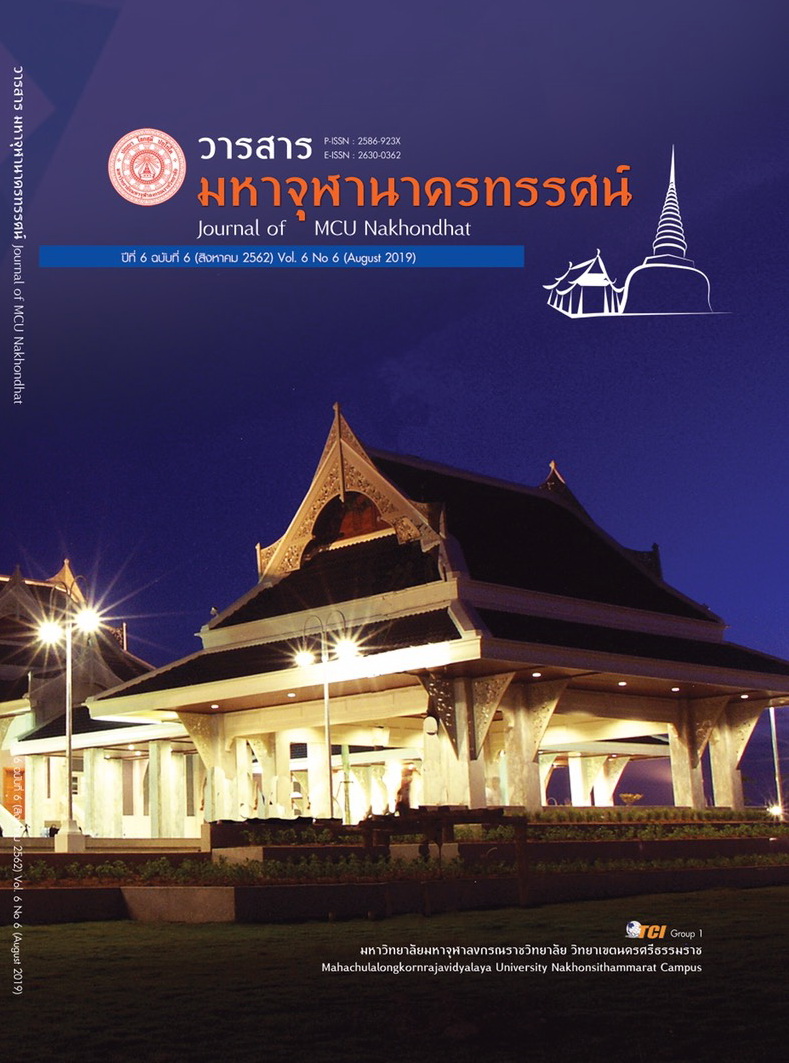A BUDDHIST PSYCHOLOGICAL LEARNING PROCESS IN THE DEVELOPMENT OF ELEMENTARY STUDENTS
Main Article Content
Abstract
The process of learning was a phenomenon as orderly change by step that is the smart system. The educated people could understand themselves and got connection among themselves and things. The process of learning could be occurred for whole time when persons had observed all around things, questioning and finding some knowledge from different things to create the main or true knowledge questing and learning for benefits in society. On the other hand, the principle of Buddhist psychology concerning with mentality and mental working process in Buddhism. It was regarded that the mental power or energy to control the body. So, both of them must be nestled to each other.
The process of learning according to Buddhist psychology to help primary students’ development is for relationship between human and objects (Kaya Bavana). The development between human and worldly (Sila Bavana) mental development (Jitta Bavana) and wisdom development (Pañña Bavana) by which students can be developed and all problems were resolved by themselves. The expression became the desirable behavior with Buddha principles that had classified into 3 parts 1) the behavioral improvement with precept, 2) the behavioral improvement with ethics, 3) the behavioral improvement with responsibility that was the principle of the monks’ behavior which could applied to support faith, respect, admire and trust from people who met. In addition, the process of learning according to Buddhist psychology focused on taking students who could correctly resolve problems life everyday by each person. Therefore, self-development is not only knowledge for seeking, but also, we could learn by connection with 6 organs namely eye, ear, nose, body, mind that convey and join the social learning and long-life learning as well.
Article Details
References
พระธรรมปิฎก (ป.อ.ปยุตฺโต). (2546). พจนานุกรมพุทธศาสตร์ ฉบับประมวลศัพท์ (พิมพ์ครั้งที่ 9). กรุงเทพมหานคร: โรงพิมพ์มหาจุฬาลงกรณราชวิทยาลัย.
พระธรรมปิฎก (ป.อ.ปยุตฺโต). (2546). พจนานุกรมพุทธศาสน์ ฉบับประมวลธรรม (พิมพ์ครั้งที่ 9). กรุงเทพมหานคร: โรงพิมพ์มหาจุฬาลงกรณราชวิทยาลัย.
พระธรรมปิฎก (ป.อ.ปยุตฺโต). (2546). พุทธธรรม ฉบับปรับปรุงและขยายความ (พิมพ์ครั้งที่ 11). กรุงเทพมหานคร: โรงพิมพ์มหาจุฬาลงกรณราชวิทยาลัย.
พระเผด็จ ทตฺตชีโว. (2530). เสขิยวัตร : ต้นบัญญัติของมารยาทไทย. กรุงเทพมหานคร: โรงพิมพ์นิวไวเต็ก.
พระไพศาล วิสาโล. (2544). กระบวนการเรียนรู้แบบพุทธ. วารสารเสขิยธรรม, 44(11), 13-17.
มหาจุฬาลงกรณราชวิทยาลัย. (2539). พระไตรปิฎกภาษาไทย ฉบับมหาจุฬาลงกรณราชวิทยาลัย. กรุงเทพมหานคร: โรงพิมพ์มหาจุฬาลงกรณราชวิทยาลัย.
วรวิทย์ วศินสรากร. (2546). กระบวนการเรียนรู้อย่างพุทธ. วารสารสารานุกรมศึกษาศาสตร์, 28, 173-175.
สุมน อมรวิวัฒน์. (2542). การพัฒนาการเรียนรู้ ตามแนวพุทธศาสตร์ ทักษะกระบวนการเผชิญสถานการณ์. นนทบุรี: โรงพิมพ์มหาวิทยาลัยสุโขทัยธรรมาธิราช.


